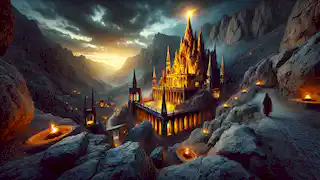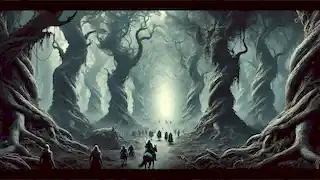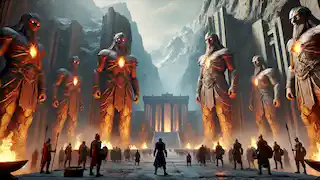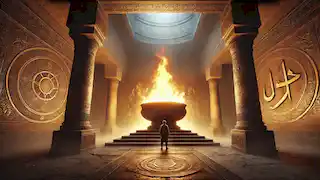The Tale of the Fire Temple of Azar
Reading time: 10 min

About this story: The Tale of the Fire Temple of Azar is a Legend from Iran set in the Medieval This Dramatic tale explores themes of Courage and is suitable for Adults. It offers Cultural insights. A prince’s quest to unlock the power of an eternal flame leads to a journey of sacrifice and destiny.
In the heart of the ancient lands of Persia, where mountains kissed the skies and deserts stretched endlessly beneath the golden sun, there was a temple. This was no ordinary structure, for it was said to house the sacred fires of Azar, an eternal flame born from the gods themselves. For centuries, the fire had burned, its embers casting a warm glow that illuminated the lives of the people who lived in its shadow. It was a symbol of life, a beacon of hope, and a reminder that in the darkest times, light could always prevail.
The tale of the Fire Temple of Azar is one shrouded in myth and legend. Some say it was built by the ancient Zoroastrians, who believed fire to be the purest of elements. Others believe it was the work of forgotten gods, long vanished from the world but leaving behind their mark. Regardless of its origins, the temple was revered by all who knew of it. But with reverence came desire, and many sought to control the flames for their own ends.
The year was 1052, and Persia was under the rule of a powerful dynasty that extended its reach across vast territories. It was during this time that the legend of the Fire Temple reached the ears of a young prince named Kaveh, a man torn between duty and ambition, and whose destiny would forever be intertwined with the temple’s eternal fire.
The Prince's Journey
Kaveh stood at the balcony of his palace, overlooking the sprawling city of Esfahan. His father, Shah Ardeshir, had grown ill, and it was only a matter of time before Kaveh would ascend the throne. Yet, his heart was restless. Though he was trained in the art of war and diplomacy, something within him longed for more. The tales of the Fire Temple of Azar had intrigued him since childhood, but he had never been allowed to venture far enough to seek it.
One night, Kaveh’s dreams were filled with visions of the temple: towering spires of stone and gold, with an eternal flame glowing at its heart. In these dreams, he saw himself standing before the fire, its warmth consuming him but leaving him untouched. It was a sign, he believed, from the gods.
"I must go to the Fire Temple," he whispered to himself.
His advisors were cautious. "My lord," said Mehrdad, the court scholar, "the path to the temple is treacherous. It lies deep within the Zagros Mountains, beyond the lands where men have trod for many years. There are tales of beasts that guard the way and spirits that haunt the travelers."
"I am not afraid," Kaveh replied with a steely determination. "I have seen the fire in my dreams. I must go, for there lies my destiny."
And so, against the wishes of his council, Kaveh set forth on his journey to the Fire Temple of Azar. He was accompanied only by a small band of loyal warriors, men who had fought by his side in the past and trusted him with their lives. The journey would be long and dangerous, but Kaveh knew that to find the temple, he would have to face the unknown.
The first leg of their journey took them through the fertile plains of Persia, past villages and towns where the people hailed Kaveh as their future king. But as they drew closer to the mountains, the terrain became harsher. The green fields gave way to rocky crags and narrow paths, and soon they were enveloped by the imposing shadow of the Zagros Mountains.

The Enchanted Woods
On the third day of their ascent, the group encountered an unexpected barrier: a vast forest, dense with trees that seemed to whisper secrets as the wind passed through their leaves. It was said that these woods were enchanted, and few who entered ever returned.
Mehrdad had warned Kaveh of this place. "The trees are said to be alive," he had told the prince. "They feed on the fears of men and turn their doubts into reality. Only those with the purest of hearts can find their way through."
But Kaveh, undeterred by the warnings, led his men into the forest. The air was thick with mist, and soon, they could barely see the path ahead. The trees loomed tall, their branches twisted and gnarled, casting long shadows that seemed to move on their own. Strange sounds echoed in the distance—whispers, cries, and laughter—all too unsettling to ignore.
That night, as they made camp, Kaveh had another dream. This time, he stood in the heart of the enchanted woods, and before him appeared a woman, her form shrouded in shadow but her voice soft and clear.
"Prince Kaveh," she said, "you seek the Fire Temple, but to reach it, you must first face your greatest fear."
"What is my greatest fear?" Kaveh asked, his voice steady.
"That is for you to discover," the woman replied, fading into the mist.
Kaveh awoke with a start, his heart racing. He did not know what his greatest fear was, but he knew that it lay ahead, waiting for him within the temple. The next morning, they pressed on, and as they neared the edge of the forest, they encountered a strange figure: an old man, sitting on a rock, whittling a piece of wood.
"Traveler," the old man said, not looking up from his work, "why do you seek the Fire Temple?"
"I seek my destiny," Kaveh replied.
"The fire is powerful," the old man said. "It can grant you what you desire, but it will also reveal the truth within your soul. Be sure that you are ready for what you find."
Kaveh nodded, unsure of what the old man meant. But there was no turning back now. The temple awaited him, and he would not rest until he stood before the eternal flame.
The Guardians of the Temple
After leaving the enchanted woods, the path became even more perilous. The air grew thin, and the winds howled as if the mountains themselves were warning them to turn back. Yet, Kaveh pressed on, his resolve unwavering. Soon, they reached the base of the mountain where the temple was said to reside, hidden among the jagged peaks.
It was there that they encountered the guardians—creatures of stone and fire, said to have been placed by the ancient gods to protect the sacred flame. These beings were colossal, towering over Kaveh and his men, their bodies glowing with the heat of the earth itself.
"We must pass," Kaveh declared, stepping forward.
The guardians did not move. Instead, a deep, rumbling voice echoed from within the mountains. "Only the worthy may enter the temple. To prove your worth, you must answer the riddle of the flame."
Kaveh listened carefully as the voice continued. "What burns but does not consume? What dies but is never dead?"
He paused for a moment, the words echoing in his mind. His thoughts turned to the temple’s eternal fire, the flame that had burned for centuries without ever fading. Finally, he spoke.
"Hope," Kaveh said. "Hope burns within us all, and though we may falter, it never truly dies."
The guardians were silent for a moment before the ground beneath them shifted, and the entrance to the temple was revealed. Kaveh had passed the test.

The Eternal Flame
Inside the temple, the air was thick with the scent of burning incense and the warmth of the fire that had burned for untold centuries. The walls were adorned with ancient carvings depicting the gods and the creation of the world. At the center of the temple stood a massive brazier, within which the eternal flame blazed, its light casting flickering shadows across the stone floor.
Kaveh approached the flame, his heart pounding. This was the moment he had been waiting for. The fire beckoned to him, its warmth wrapping around him like a cloak. As he stood before it, the flame flickered and grew, as if acknowledging his presence.
Suddenly, the voice from his dreams returned, echoing through the temple. "You have come far, Prince Kaveh. But the flame does not give freely. It requires a sacrifice."
Kaveh’s breath caught in his throat. "What must I sacrifice?"
"To claim the power of the fire, you must give up that which you hold most dear."
He hesitated, his mind racing. What did he hold most dear? His family, his kingdom, his honor? But as he looked into the heart of the flame, he realized that it was not material things that the fire sought. It was his very soul.
"If I give up my soul," Kaveh whispered, "what will remain of me?"
The voice was silent, and the flame danced higher, its heat growing more intense. Kaveh closed his eyes, feeling the fire's warmth envelop him. He knew that to claim the power of the temple, he would have to let go of everything he had ever known.
In that moment, he made his choice.

The Return of the King
When Kaveh emerged from the temple, the fire still burned within him, but he was no longer the man he had been. His eyes glowed with the light of the eternal flame, and his heart beat with the power of the gods. He had given up his soul, but in return, he had gained something far greater: the ability to lead his people into a new age of prosperity and peace.
His men, seeing the transformation in their prince, bowed before him
. "My lord," one of them said, "you are no longer just a prince. You are a king."
Kaveh nodded, his gaze fixed on the horizon. He knew that his journey was far from over. The fire had given him power, but it had also placed a burden on his shoulders. He would have to rule with wisdom and compassion, for the flame had shown him that true strength lay not in dominance, but in the ability to inspire hope in others.
With the eternal flame burning within him, Kaveh returned to his kingdom. Under his rule, Persia flourished, and the legend of the Fire Temple of Azar grew. But Kaveh never forgot the sacrifice he had made, nor the lessons the flame had taught him.
{{{_04}}}
Epilogue: The Legacy of the Flame
Centuries passed, and the Fire Temple of Azar remained, hidden in the mountains, its eternal flame still burning. The story of Prince Kaveh became legend, a tale told by the fireside in villages across Persia. Some said that he had become immortal, his soul forever bound to the flame. Others believed that he had passed into the realm of the gods, where he watched over his people from the heavens.
But the truth was known only to those who had ventured into the temple and stood before the eternal flame. They knew that the fire was not just a source of power, but a symbol of hope, a reminder that even in the darkest times, light could always be found.
And so, the flame continued to burn, its light a beacon for all who sought it.


















